Interview with Ichiro Okouchi, the script of 'Our Seven-Day War', how was the story that brought back the work 30 years ago to the present day?

The original was published in 1985. After that, it was made into a live-action movie starring Rie Miyazawa in 1988, but what kind of efforts were made to revive the work that has passed more than 30 years since then in 2019, in this work I have asked various questions to Mr. Ichiro Okouchi, who works on the script.
Our 7-day war
http://7dayswar.jp/
30 years after that war
— Movie “Our Seven-Day War” (@ 7dayswar_movie) October 2, 2019
A new battle begins.
Of 'Our 7-day War'
PV has been released!
'I decided to live like myself.'
December 13th (Friday) National Road Show https://t.co/8zNvsWWgjQ # 7 days #Takumi Kitamura #Kyoko Yoshine #Rie Miyazawa pic.twitter.com/uxEE8mjy4L
GIGAZINE (hereinafter, G):
I hear that the movie 'Our Seven-Day War' is a project that started in the winter of 2016 toward the 10th anniversary of 'Kadokawa Tsubasa Bunko' in 2019. What was your impression of the original novel?
Ichiro Okochi (hereinafter referred to as Okochi):
The first time I touched 'Bokura no Nanoka War' was a movie starring Rie Miyazawa. I remember reading the original after watching the movie and being surprised that no tanks came out. 'Change this original like this!'
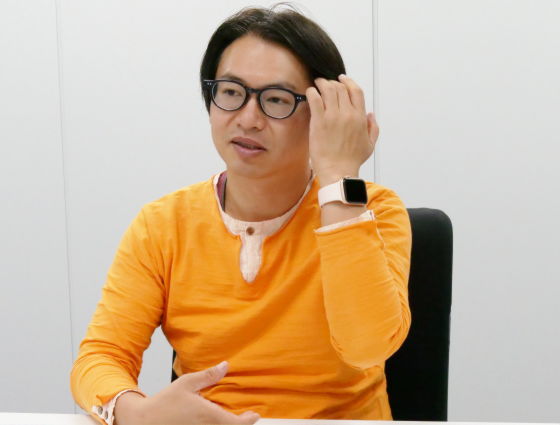
Okochi:
Looking back now, the actors are very nice. Rie Miyazawa, of course, villain adults are good.
G:
Shiro Sano .
Okochi:
Yes, Mr. Sano. I think it's really nice to be a young teacher who isn't an old man yet, with just the right amount of hatred and adultness.
G:
In the movie, Rie Miyazawa was 15 years old at the time, so I think she had the impression that she had a younger child.
Okochi:
It was a time when teenage female idols such as Miyazawa-san and Gokumi (Kumiko Goto) were prominent. At that time, I was a college student, so I had the impression that the movie was for the younger generation than me.
G:
This work will be a new work 30 years after that movie. Did you have any orders from the production side when writing?
Okochi:
Please make it a modern story, not a story of that time. Then I was asked to make the hero's age a high school student. I think the reason why I am a high school student is that I think that high school students are the volume zone of the audience. The modern story was a convincing order considering that I want the current customers to see it. However, the present age is not the age of management education like the original, and it is interesting to set up to contact friends outside the abandoned factory of the original, but now it is easy to contact using a smartphone. In addition, he said, 'In the first place, modern children don't choose to stand up.'
G:
It's from the main premise (laughs)
Okochi:
However, I think it's a tremendous pleasure for strangers in the original story to gather in one place and live a communal life while fighting against the enemy. This structure is also found in robot animation. Unfamiliar people will be on a big ship and will move while fighting the enemy. The same is true for 'Mobile Suit Gundam'.
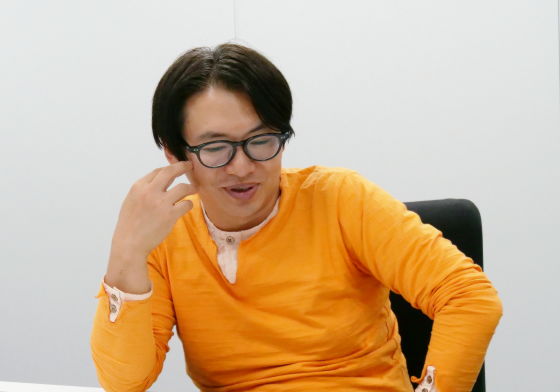
Okochi:
I think the original work that realized this structure in the present age without using mysterious power is really wonderful. And when I actually wrote it, I felt once again how powerful this structure was.
G:
This time, when creating the scenario, a script meeting was held with a total of 10 people including director
Okochi:
But that's not a big deal for me ...
G:
Really! ??
Okochi:
When making a new one, I don't think that trial and error of making it halfway and starting over is not so rare, and I think it may be necessary. In other TV series I did, there were times when 'the project changed three times' and 'the evening anime became a late night anime'.
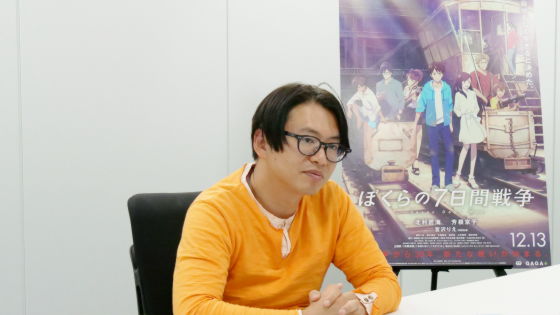
Okochi:
It's a lot of work, but I don't think it was a waste of time. I didn't feel like 'I was in trouble because I got lost' because I think that it got better as the manuscripts were repeated and changes were made.
G:
There was something that was piled up.
Okochi:
Even by trial and error, he said, 'This is better than this,' 'I'll change it because it's better,' but it wasn't 'I'm not good at this, so let's stop.' I think the final draft that I wrote was much more interesting than the script I wrote at the very beginning.
G:
Mr. Soda, the original author, says, 'The only thing I have to ask is,' I want children to talk about defeating adults, 'which I wrote consistently.' Did you arrive at the current form as a result of the part changing considerably with each revision?
Okochi:
Well, it has changed a lot. However, the basic 'high school students stand up and fight against adults, and their minds and physicals are released' is basically the same.
G:
Other gimmicks and configurations have changed.
Okochi:
If you compare it with a car, I think there are many minor change versions. I don't think it's a new model, and the basic story structure and structure haven't changed that much. Since the character has changed, some people may have the impression that it is different every time they see the script.
G:
Mr. Soda's order did not have the element of 'standing up'.
Okochi:
Yes, there wasn't.
G:
Even so, since 'standing up' is the core part of the original work, is it a feeling that 'this must be done'?
Okochi:
I agree. I think it's one of the charms of the original, and it's a strong pleasure.
G:
Earlier, there was a story that it is natural to have a smartphone now. It wasn't in the original or in the movie, but I think it was used effectively with the Internet.
Okochi:
I thought that modern high school students would use the internet after all. As a tool that can fight adults even if you stand up.
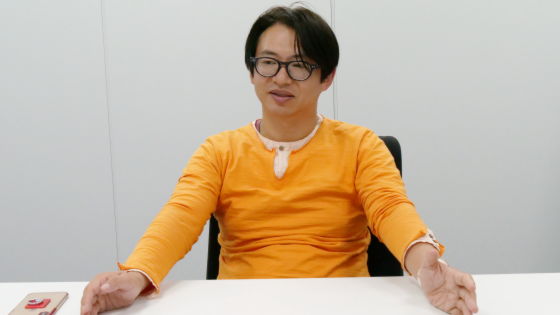
G:
Moreover, not only the good direction but also the part is drawn firmly.
Okochi:
I agree. However, even if a bad incident occurs on the Internet, I don't think at all that 'the Internet is not good. We should return to the era without the Internet.' I think the net is just a tool, and it can be good or bad depending on the person who uses it.
G:
Whether it's on the internet or a character that wasn't in the original mallet, it feels like it's just modern, but I think there were some ideas that weren't adopted. How did you choose?
Okochi:
These are the problem awareness and problems that children nowadays usually have. But it's not that difficult, 'I have a favorite person' 'I have to study, but I hate studying' 'I made my debut in high school, but I'm afraid of getting caught' 'I'm reluctant because of my parents' circumstances It is a matter such as.
I can't say much in detail, but it includes things that I wouldn't have done 30 years ago. For example, there were not so many Thais in Japan 30 years ago. However, it's not so much a claim of principle as it is just a picture of the modern world, the people in the present age, and the worries of the present age, so it's not something that I set up on the upper level.
Originally, in addition to 'Bokura', the person who was originally in the factory appears in the original. However, the character of the former Japanese soldier is not suitable for the present, so I changed it to a foreigner named Mallet. He is a person who is far from our daily life, but is certainly in the same Japan.
G:
Starting from the 0th day when 'Bokura' decides to run away from home, as the title 'Our 7-day War' shows, children fight for 7 days, but the time allocation for 7 days is How was it adjusted?
Okochi:
The title 'Our 7-day War' cannot and should not be changed, so we created a 7-day itinerary. 'How can I fight against adults for 7 days?' This is surprisingly difficult when I try it. It's quite difficult to stay upright with an adult for 7 days.

G:
If it's only the first day, it's still good.
Okochi:
I can go for the first two days or so. Adults aren't stupid either, so they're attacking in new ways.
G:
There are some elements to put in and some to drop in 7 days ...
Okochi:
that's right. In addition to the offensive and defensive battles with adults, I would like to include a drama in which children get closer and farther in the seven days. But I wasn't too worried.
G:
Really?
Okochi:
The approaching distance can be drawn in the process of defeating adults, and conversely, when a crisis occurs, the distance increases. If you link it to the situation of the battle, it feels naturally calm.
G:
In the first half, 'I see, this is how it came' and 'You can't stand up for 7 days unless you repel at first', and in the second half, 'Is it really possible to stand up for 7 days?' But when you're writing the script, do you write it cool? Or does it make me feel better when I write it, and I get high tension and can write it crunchy?
Okochi:
I'm probably a cool writer, I don't know what it looks like (laughs), but it's difficult to explain, but it's not that I didn't write it. This work must be drawn not only by children but also by adults. Since it is necessary to describe the place and explain the background on the script, it is not possible to write it with tension alone. Of course, I draw close to the character's emotions.

G:
It is necessary to take a step back while standing in the character's line of sight.
Okochi:
that's right. Of course, there are scenes that say 'I have to write this scene with Mamoru-kun's feelings', but even so, the 'scene that pulls the camera' in the production is absolutely necessary, so I'm pulling the part that pulls the camera.
G:
When you pull the camera, does it feel like 'the picture is drawn and seen' in Mr. Okouchi?
Okochi:
When I draw a script, the picture comes to mind at all. I rarely specify pictures. Therefore, even if you give the same script, I think that the film will be quite different depending on the director.
G:
When writing a script, do you ever hear the character's voice?
Okochi:
I can't hear it at all. I.
G:
When writing the script completely as letters.
Okochi:
Ah, except for works that have a voice first, such as 'Lupin III'.
(Everyone laughs)
Mr. Okouchi is involved in the script and series composition of the TV series '
Amazon | Lupine III PART5 Vol.2 [Blu-ray] | Anime

Okochi:
For characters who have already heard the voice, when asked to 'make that character', that is sometimes the case, but with regard to 'Our Seven-Day War', Rie Miyazawa aside, who will speak. It wasn't decided at the time of writing the script. Therefore, there is no way to imagine it. I'm not the one who casts or teaches acting, so I don't think it's good to have a strange image.
In the novel, some people write that the voice of this person is assumed in the postscript, but I think that is basically a job that is completed only by the writer. In the case of anime, the voice I envision does not always match the voice envisioned by the production and sound. I leave the voice to the professionals.
G:
Isn't it possible that you can hear the voice in your brain as you write it, not as the voice of the cast?
Okochi:
I think there are people like that, but I can't see the picture, I can't hear the sound or the voice. Can the director hear it? At least I don't think I can supervise it.
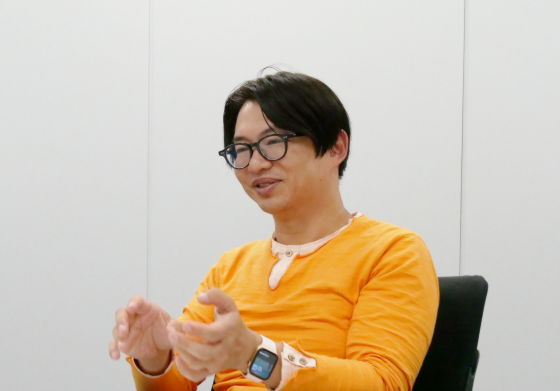
G:
Is it just a script?
Okochi:
It looks like it's going to be difficult, director.
(Everyone laughs)
Okochi:
I'm always impressed that I can think of so many things.
G:
You said that you worked with Director Murano for the first time. What kind of person did you have the impression of Director Murano?
Okochi:
Mr. Murano was a person who could properly put his thoughts into words, 'I want to do it here,' 'I don't want to do it here,' and 'I think like this.'
G:
Do some of the directors convey the image?
Okochi:
The method of communication varies depending on the director. Some people don't say clear words on purpose. To not fix the image.
G:
In that, Director Murano clearly conveyed the image.
Okochi:
I agree. He talked about why he thinks so. Thanks to that, the catch ball was smooth. That is especially reflected in the character Honda. Adults and children appear in this work, but Honda is an adult among them, but he is a young man who has not become an adult yet. I think that the bulge of this character is due to the fact that Director Murano and I, two people of different generations, have teamed up.

Okochi:
Isn't there more than one secretary to the Diet? So, at first, Honda was just Secretary C among those multiple people. I heard that there is probably one young secretary who is familiar with the current Internet situation. However, during the meeting with Director Murano, Secretary C swelled up and got the name Honda. When I think about it now, Honda is close to Director Murano, isn't it? Eyes and values. I don't think that character was born by myself, so that was really good.
G:
In this work, besides Honda, there are adults with various circumstances.
Okochi:
I agree. The adults in the original story were parents and teachers, but this time there is a lot more variety. Some adults are angry about their children's behavior, saying 'Huh!', But I'm impressed and amused because it's a job. I have the impression that adults are not as mature as they used to be.
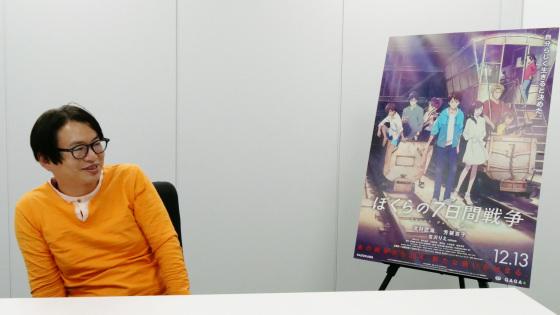
G:
Just as children have changed, so have adults.
Okochi:
It has diversified, hasn't it? In a good or bad way. In the past, adults were only salaried workers and mothers, but now there are various ways of working, such as working mothers, full-time husbands, and people working at home. The view of adults has also changed, hasn't it? In the past, when adults were reading manga, they were angry that they weren't like adults, but now that's not the case at all.
G:
Rather, adults are reading manga.
Okochi:
Nowadays, it has become a culture that you can be proud of overseas.
G:
That is the difference in the times between the original and this work, or that much has changed.
Okochi:
It has changed. Before this work, I worked with the original author,
(Everyone laughs)
Go Nagai received the 47th Japan Cartoonists Association Award, Minister of Education, Culture, Sports, Science and Technology Award in 2018, and became a hot topic as ' historical reconciliation with the educational world.'
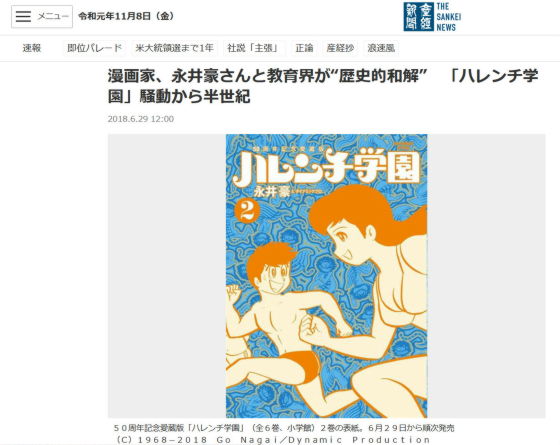
Okochi:
If the world were the same as it used to be, I don't think this work would be an anime movie either.
G:
The fact that this became an anime movie is a manifestation of the changing times.
Okochi:
Animation is now in an era where ordinary people can see it. Not what children and some fans see.
G:
surely. The story changes, and the question is about Mr. Okouchi, not the work, but I would like to ask you about the writing environment.
Okochi:
What is the environment?
G:
I don't think it's handwritten, so I wonder what kind of software I'm using.
Okochi:
It's a text editor. There are a lot of word processing software like Microsoft Word now, but I use an editor. There is a software called ' O's Editor ' that is like a purveyor to screenwriters. It is convenient because there is a function to re-edit the screenplay. I don't know if it's okay to give the name of the specific software.
G:
fine. Earlier, Gen Urobuchi told me that he was using Story Editor .
Okochi:
I used to use software called 'WZ EDITOR ' for a long time, but it became difficult to use after the version changed, so I switched to 'O's Editor' at the recommendation of an acquaintance. After all, word processing software still has a heavy image, and I still use an editor after all.
G:
If the typing speed is fast, you will be asked to react properly. Is that the way it is?
Okochi:
I agree. Also, when the proofreading function says 'Japanese is wrong', I think 'Noisy! It's a character that talks like this!'.
(Everyone laughs)
G:
So, is the script written on a PC all the time?
Okochi:
I agree. However, there are some new changes recently. Until now, when I wrote a manuscript, I printed it out, put it in red, put it in blue, and reflected it, and so on. When I was writing, it wasn't objective, so I printed it on paper once and read it objectively to see if it was interesting or boring. I used to be an editor, and I used to read the manuscript I received from the writer while putting a red pen and sticking notes on it.
I had that habit and used to do it that way, but lately I'm using tablets instead of paper. Read it on your tablet, put red on your tablet with a pen, and so on. Unlike paper, it does not take up much space, is easy to carry, and has a hierarchical structure that allows you to store old information, which is convenient. Well, tablets are great. very good.
G:
After finishing writing, calmly review it with the eyes of the editor.
Okochi:
As a switch to switch feelings, the style of adding red by hand on the launched one has not changed. Red is a minor correction, and blue is like a flow correction. For example, the atmosphere so far is fun, and I feel nervous after changing from this scene. From here, the scene will be shortened, and the climax will be around this time. The blue letters are like that.
G:
I think there is always a deadline in the script, but is there anything you are doing to meet the deadline?
Okochi:
No, it's just going to the desk.
G:
Does the deadline feel like it's being met naturally, or is there something you're doing to meet it?
Okochi:
On the contrary, what are you guys doing? Is there anything I can do to meet the deadline?
G:
I've heard from Kazuki Nakashima
Okochi:
I think I'm the one who protects. I used to be an editor, and I was the one who collected people's manuscripts ...
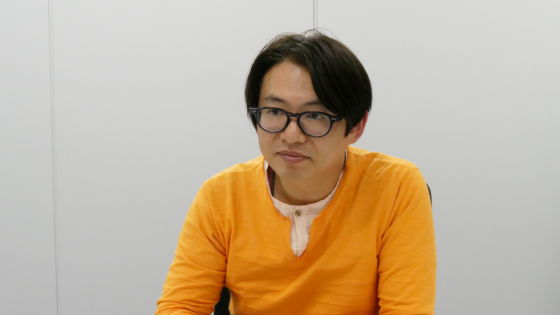
Okochi:
In reality, the book will come out even if the manuscript is delayed a little. That's why I was once told, 'Hey, it's been three days late, but it's a book,' but that's not the case. I could have ordered a better designer if I gave it to the deadline. Once again, I was able to adjust the color development by taking the color school, but by giving it according to the deadline, the quality can be improved.
Even if the animation is delayed, it will be aired even if the script is delayed. But even though it was aired, 'I could have asked this animator if it was true, but I couldn't because it was late.' 'I should have been able to retake it again, but I couldn't.' In other words, if my script is delayed, the quality will decrease accordingly. Of course, I don't like the quality of the script I wrote. Therefore, I am doing my best to meet the deadline for myself.
G:
That's why it's natural to protect.
Okochi:
That doesn't mean I can protect it, but I will try to protect it.
G:
I thought it would be difficult for both adults and children to describe the emotions of this work, but have you been careful in writing this separately?
Okochi:
It's not particularly difficult because it's an adult and a child. Even children alone have different personalities, so it's really hard. Because I'm an adult, I don't think I'm smart or human. When I was a kid, I thought I was an adult, but when I became an adult, that wasn't the case at all. He is sick, upset, and has a weak will. The technique of keeping the outer surface has only improved a little. The contents do not change so much. Because they are the same person.
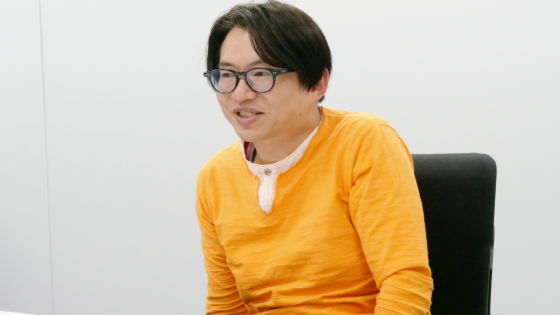
G:
Is there something like writing a script and the character moving on its own?
Okochi:
It doesn't start moving on its own, but it can't move on its own. If a character who had a sense of justice suddenly tried to take a cowardly measure, he wouldn't do it. As the character grows up, that kind of fleshing also means that it can't be moved at the convenience of the scriptwriter.
G:
Characters don't always move at the convenience of the director or screenwriter ...
Okochi:
You can move it, but you don't want to.
G:
Thanks to that, the act of standing up for 7 days is fantasy, but the characters behave very naturally.
Okochi:
I would be happy if you could say that. No mysterious power or aliens appear in this work. The characters are all ordinary people. There are no geniuses or unusual criminals.
G:
Even the children who appear in this work are all children who say, 'Maybe I was such a child in the past.'
Okochi:
How can ordinary children fight adults like us, or as we used to? What kind of youth can you spend with your classmates who wouldn't normally meet? I wonder if I would do this while watching their actions in the theater. I hope you can see it while feeling that I shouldn't do that either.
G:
So that's it. Thank you very much.
The movie 'Our Seven-Day War' will be screened at movie theaters nationwide from December 13, 2019 (Friday).
Movie 'Our Seven-Day War' Notice [Released on Friday, December 13] --YouTube
c2019 Osamu Soda / KADOKAWA / Our 7-day War Production Committee
Related Posts:







